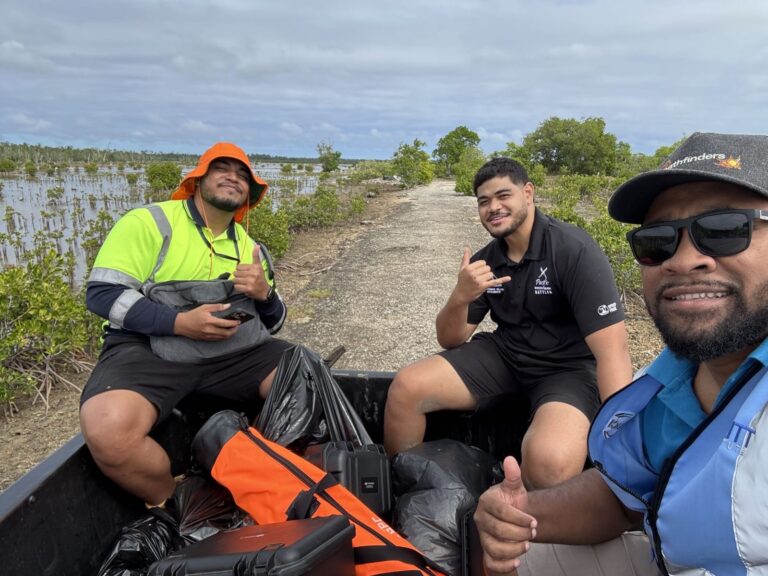Ads are appearing daily across online job boards for development roles in the Pacific – whether on Eco-Consult Pacific or LinkedIn. And most notable is the encouragement for regional and national candidates to apply.
The reason is simple. Locals know their own countries best.
Donor partners, consulting agencies and regional organisations are boosting efforts to recruit skilled, qualified technical experts and businesses in-country who will contribute real value and efficiency in project design and implementation.
But a challenge, as discussed by Georgia Hammersley in The Interpreter last month, can be access to funding, particularly from the growing sources of international climate finance, such as the Green Climate Fund.
Delegates at the Australia Pacific Islands Business Council’s Pacific Infrastructure Conference in Brisbane in September discussed strengthening local content in development projects. Aligning with the goals of governments and other development partners in the region, the World Bank highlighted its new commitment to ensure at least 30% of all labour costs of future projects must utilise local resources and workforce. Other multilateral agencies have also recognised local workers are “essential to achieving stronger and more sustainable results”. The shift also follows an important 2021 report “Enhancing Procurement Practice and Local Content in Pacific Infrastructure”.
These trends demonstrate the practical application of the new “localisation agenda” in development practice, representing a new emphasis on empowering and benefiting local communities by leveraging local expertise, knowledge and commitment to improve project, and broader social and economic, outcomes.
The resilience of communities, infrastructure and ecosystems will increasingly depend on the data and information collected by local teams.
For example, DT-Global, a top five international development contractor, advertised four positions based in Tonga and Solomon Islands to work on a New Zealand-funded Climate Finance Capacity Support Program. The vacancies were for a Procurement Officer and a Technical Officer to support the Tonga Climate Change Fund, plus two Geographical Information System (GIS) Officers to provide spatial analysis and general mapping needs.
A number of local and regional businesses are capitalising on the opportunity to train and equip local personnel. Armed with the skills and the latest technologies, locally procured technicians now conduct essential diagnostic surveys and data analysis to address the needs of specific development projects. Project management units can now rely on competent teams in most Pacific capitals and regional centres, with the necessary equipment, to be deployed efficiently, safely, economically and often with superior results achieved in a fraction of the time.
In Tonga, for example, a team of young technicians and data analysts were engaged in the mangrove ecosystem fieldwork, using drones, during the recent Biodiversity and Plastic Pollution Baseline Survey, supported by the International Union for the Conservation of Nature in partnership with the Tonga Ministry of Environment.
Another example is SkyEye Pacific, with offices in Samoa, Solomon Islands, Tonga and Vanuatu, which provides geospatial and remote sensing services using Unmanned Aerial Vehicles. In Samoa, SkyEye has been contracted by the Ministry of Natural Resources and Environment and the UN Development Program following devastating tropical cyclones to collect and analyse spatial drone imagery to contribute to damage assessments and recovery plans. SkyEye Pacific received an APSEA Technical Excellence Award in 2019.
Partnerships with local communities, regional organisations, and Pacific governments allows donor agencies to individually and collectively support efforts to employ local capacity. This can also enhance readiness, particularly to deploy more efficient and affordable technologies and know-how. The resilience of communities, infrastructure and ecosystems will increasingly depend on the data and information collected by local teams. This builds on climate and disaster risk assessments, crucial for preparedness and resilience, especially in the Pacific region.
The impact of these new dimensions of development practice represents a significant opportunity to contribute to the broader Sustainable Development Goals of the countries. It is also a real power shift – as the key goal is to increase direct funding to local and national organisations. Promoting equitable, mutually accountable partnerships between international and local partners directly addresses goal 17 of the Sustainable Development Goals, which emphasises that, to be successful, preceding goals require multi-stakeholder partnerships between governments, businesses, and civil society at local, national, and international levels.
Recognising this shift towards localisation is an essential step towards making sure that international climate finance is made accessible to all.
Images are for reference only.Images and contents gathered automatic from google or 3rd party sources.All rights on the images and contents are with their legal original owners.

